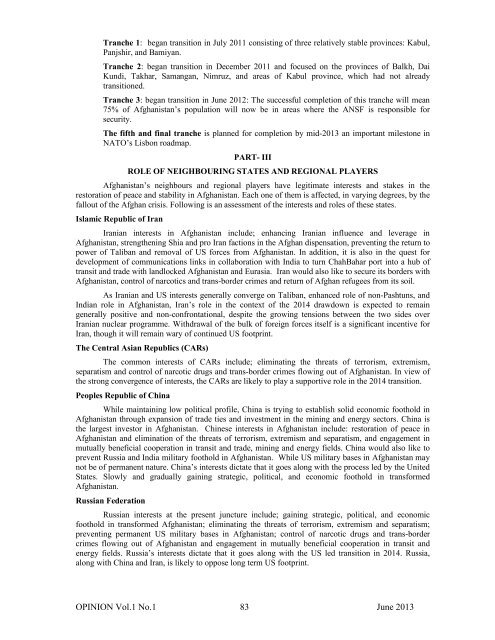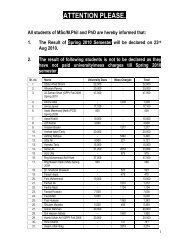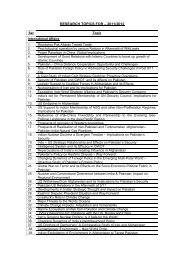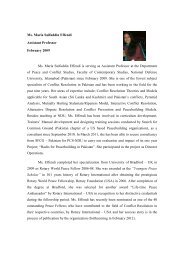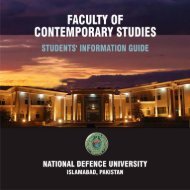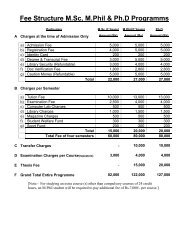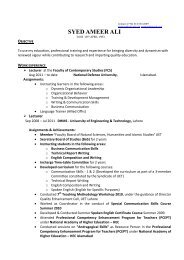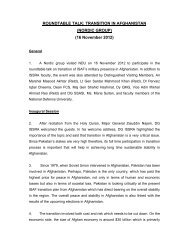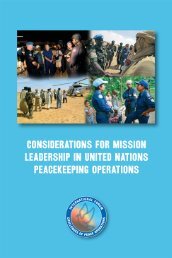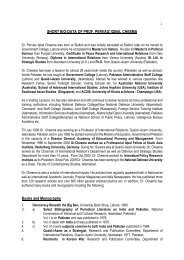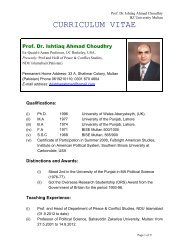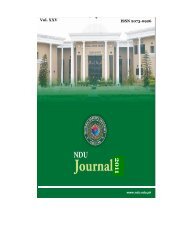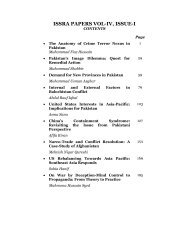OPINION Vol.1, No.1 June 2013 - National Defence University
OPINION Vol.1, No.1 June 2013 - National Defence University
OPINION Vol.1, No.1 June 2013 - National Defence University
Create successful ePaper yourself
Turn your PDF publications into a flip-book with our unique Google optimized e-Paper software.
Tranche 1: began transition in July 2011 consisting of three relatively stable provinces: Kabul,<br />
Panjshir, and Bamiyan.<br />
Tranche 2: began transition in December 2011 and focused on the provinces of Balkh, Dai<br />
Kundi, Takhar, Samangan, Nimruz, and areas of Kabul province, which had not already<br />
transitioned.<br />
Tranche 3: began transition in <strong>June</strong> 2012: The successful completion of this tranche will mean<br />
75% of Afghanistan’s population will now be in areas where the ANSF is responsible for<br />
security.<br />
The fifth and final tranche is planned for completion by mid-<strong>2013</strong> an important milestone in<br />
NATO’s Lisbon roadmap.<br />
PART- III<br />
ROLE OF NEIGHBOURING STATES AND REGIONAL PLAYERS<br />
Afghanistan’s neighbours and regional players have legitimate interests and stakes in the<br />
restoration of peace and stability in Afghanistan. Each one of them is affected, in varying degrees, by the<br />
fallout of the Afghan crisis. Following is an assessment of the interests and roles of these states.<br />
Islamic Republic of Iran<br />
Iranian interests in Afghanistan include; enhancing Iranian influence and leverage in<br />
Afghanistan, strengthening Shia and pro Iran factions in the Afghan dispensation, preventing the return to<br />
power of Taliban and removal of US forces from Afghanistan. In addition, it is also in the quest for<br />
development of communications links in collaboration with India to turn ChahBahar port into a hub of<br />
transit and trade with landlocked Afghanistan and Eurasia. Iran would also like to secure its borders with<br />
Afghanistan, control of narcotics and trans-border crimes and return of Afghan refugees from its soil.<br />
As Iranian and US interests generally converge on Taliban, enhanced role of non-Pashtuns, and<br />
Indian role in Afghanistan, Iran’s role in the context of the 2014 drawdown is expected to remain<br />
generally positive and non-confrontational, despite the growing tensions between the two sides over<br />
Iranian nuclear programme. Withdrawal of the bulk of foreign forces itself is a significant incentive for<br />
Iran, though it will remain wary of continued US footprint.<br />
The Central Asian Republics (CARs)<br />
The common interests of CARs include; eliminating the threats of terrorism, extremism,<br />
separatism and control of narcotic drugs and trans-border crimes flowing out of Afghanistan. In view of<br />
the strong convergence of interests, the CARs are likely to play a supportive role in the 2014 transition.<br />
Peoples Republic of China<br />
While maintaining low political profile, China is trying to establish solid economic foothold in<br />
Afghanistan through expansion of trade ties and investment in the mining and energy sectors. China is<br />
the largest investor in Afghanistan. Chinese interests in Afghanistan include: restoration of peace in<br />
Afghanistan and elimination of the threats of terrorism, extremism and separatism, and engagement in<br />
mutually beneficial cooperation in transit and trade, mining and energy fields. China would also like to<br />
prevent Russia and India military foothold in Afghanistan. While US military bases in Afghanistan may<br />
not be of permanent nature. China’s interests dictate that it goes along with the process led by the United<br />
States. Slowly and gradually gaining strategic, political, and economic foothold in transformed<br />
Afghanistan.<br />
Russian Federation<br />
Russian interests at the present juncture include; gaining strategic, political, and economic<br />
foothold in transformed Afghanistan; eliminating the threats of terrorism, extremism and separatism;<br />
preventing permanent US military bases in Afghanistan; control of narcotic drugs and trans-border<br />
crimes flowing out of Afghanistan and engagement in mutually beneficial cooperation in transit and<br />
energy fields. Russia’s interests dictate that it goes along with the US led transition in 2014. Russia,<br />
along with China and Iran, is likely to oppose long term US footprint.<br />
<strong>OPINION</strong> <strong>Vol.1</strong> <strong>No.1</strong> 83 <strong>June</strong> <strong>2013</strong>


